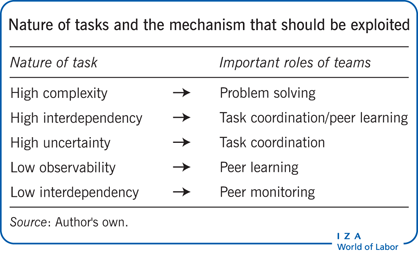Elevator pitch
The keys to effective teamwork in firms are (1) carefully designed team-formation policies that take into account what level of diversity of skills, knowledge, and demographics is desirable and (2) balanced team-based incentives. Employers need to choose policies that maximize the gains from teamwork through task coordination, problem solving, peer monitoring, and peer learning. Unions and labor market regulations may facilitate or hinder firms’ attempts at introducing teams and team-based incentives.

Key findings
Pros
Diverse teams in terms of skills, knowledge, and information sources benefit from matching workers and tasks appropriately and facilitating learning within teams.
Uniform teams exhibit lower communication costs and higher levels of trust and worker satisfaction.
Self-selected teams tend to have stronger social connections among team members and thus mitigate free-riding and encourage peer learning.
Compensation based on team performance encourages task coordination, problem solving, peer monitoring, and peer learning.
Cons
Uniform teams may experience limited opportunities for task coordination, problem solving, and peer learning.
Demographically uniform teams may have similar problems because they often rely on the same information sources.
Self-selected teams may engage in unproductive socialization. Self-selection could also lead to more uniform teams than desired.
Team-based pay (in which all members are paid equally) may encourage free-riding and break-ups of teams due to dissatisfaction with unequal contributions.